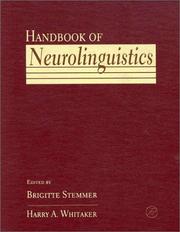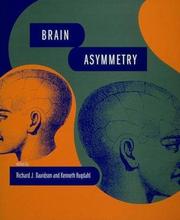| Listing 1 - 8 of 8 |
Sort by
|
Book
ISBN: 1421423340 9781421423340 9781421423333 1421423332 Year: 2017 Publisher: Baltimore, Maryland Johns Hopkins University Press
Abstract | Keywords | Export | Availability | Bookmark
 Loading...
Loading...Choose an application
- Reference Manager
- EndNote
- RefWorks (Direct export to RefWorks)
Written in a lively style that mixes personal biography with scholarly research, On the Other Hand tells a comprehensive story about the science, traditions, and prejudices surrounding left-handedness.
Attitude --- Mental Disorders --- Functional Laterality --- etiology
Periodical
Abstract | Keywords | Export | Availability | Bookmark
 Loading...
Loading...Choose an application
- Reference Manager
- EndNote
- RefWorks (Direct export to RefWorks)
Functional Laterality --- Laterality --- Cerebral dominance --- Latéralité --- Dominance cérébrale --- Periodicals. --- Periodicals --- Périodiques --- Cerebral dominance. --- Laterality. --- Health Sciences --- General and Others --- Neurology --- Psychiatry & Psychology --- Physiology --- Health Sciences. --- Psychiatry & Psychology. --- Functional Laterality. --- Psychology. --- Dominance, Cerebral --- Functional asymmetry (Brain) --- Hemispheric dominance (Brain) --- Lateralization (Brain) --- Left and right brain --- Right and left brain --- Ambidexterity --- Behavioral Laterality --- Handedness --- Laterality of Motor Control --- Mirror Writing --- Laterality, Behavioral --- Laterality, Functional --- Mirror Writings --- Motor Control Laterality --- Writing, Mirror --- Writings, Mirror --- Cerebral hemispheres --- Dual-brain psychology --- Whole brain learning --- Split-Brain Procedure --- Psychophysiology

ISBN: 0126660557 9780126660555 9780080533131 0080533132 1281057096 9781281057099 9786611057091 Year: 1998 Publisher: San Diego : Academic Press,
Abstract | Keywords | Export | Availability | Bookmark
 Loading...
Loading...Choose an application
- Reference Manager
- EndNote
- RefWorks (Direct export to RefWorks)
The Handbook of Neurolinguistics is a state-of-the-art reference and resource book; it describes current research and theory in the many subfields of neurolinguistics and its clinical application. Thorough and clearly written, the Handbook provides an excellent overview of the field of neurolinguistics and its development.The book is organized into five parts covering the history of neurolinguistics, methods in clinical and experimental neurolinguistics, experimental neurolinguistics, clinical neurolinguistics, and resources in neurolinguistics. The first four parts contain a
Psycholinguistics --- Neurolinguistics. --- Medische psychologie --- neuropsychologie. --- Neurolinguistics --- Neurolinguistique. --- Brain --- Functional Laterality. --- Language Development. --- Psycholinguistics. --- physiology. --- Language, Psychology of --- Language and languages --- Psychology of language --- Speech --- Linguistics --- Psychology --- Thought and thinking --- Neuro-linguistics --- Biolinguistics --- Higher nervous activity --- Neuropsychology --- Psychological aspects --- Language Development --- physiology

ISBN: 0262041448 0262540797 9780262540797 0262271249 0585326630 9780585326634 Year: 1998 Publisher: Cambridge, Mass. The MIT Press
Abstract | Keywords | Export | Availability | Bookmark
 Loading...
Loading...Choose an application
- Reference Manager
- EndNote
- RefWorks (Direct export to RefWorks)
Functional Laterality --- Dominance, Cerebral --- Cerebral dominance --- Laterality --- 612.8 --- Psychophysiology --- Dual-brain psychology --- Functional asymmetry (Brain) --- Hemispheric dominance (Brain) --- Lateralization (Brain) --- Left and right brain --- Right and left brain --- Cerebral hemispheres --- Whole brain learning --- Zenuwstelsel. Zintuigen. Motorische neurowetenschappen --- Cerebral dominance. --- Laterality. --- Affective and dynamic functions --- Cognitive psychology --- Physiology of nerves and sense organs --- Dominance cérébrale --- Latéralité --- Humans --- Brain
Book
ISBN: 0128016914 0128014261 9780128014264 9780128016916 Year: 2016 Publisher: London, [England] : Academic Press,
Abstract | Keywords | Export | Availability | Bookmark
 Loading...
Loading...Choose an application
- Reference Manager
- EndNote
- RefWorks (Direct export to RefWorks)
Control of movement is central to successful sports performance. Laterality is a critical part of this movement control as players typically have a preference for relying on a dominant side. Tennis players may hold the racket primarily in their dominant hand, and soccer or football players may kick with their dominant foot. Laterality also comes into play in the direction to turn as in performing a spin in figure skating or which eye to use when aiming at a target. Laterality in sports summarizes research findings in this area from psychology, evolutionary biology, and neuroscience. Coverage includes the origins and persistence of laterality in humans; measurement of laterality and its relevance in sports; the cognitive neuroscience of laterality; laterality's impact on talent identification, skill acquisition, and athlete development; performance differences between left- and right-sided athletes; laterality in individual and team sports; biomechanical aspects of laterality; and sports medicine perspectives on laterality. Chapters review current research and discuss the implications of these findings for sport practice.--
Laterality. --- Sports --- Psychological aspects. --- Physiological aspects. --- Laterality --- Cognitive neuroscience --- Functional Laterality --- Psychological aspects --- physiology --- Athletics --- Sports physiology --- Sports sciences --- Motivation in sports --- Sport psychology --- Sports motivation --- Sports psychology --- Psychophysiology --- Cerebral dominance --- Dual-brain psychology --- Physiological aspects --- Sports - Psychological aspects --- Sports - physiology
Book
ISBN: 0128013575 0128012390 9780128013571 9780128012390 Year: 2016 Publisher: London, [England] : Academic Press,
Abstract | Keywords | Export | Availability | Bookmark
 Loading...
Loading...Choose an application
- Reference Manager
- EndNote
- RefWorks (Direct export to RefWorks)
Laterality. --- Left- and right-handedness. --- Handedness --- Right- and left-handedness --- Laterality --- Left and right (Psychology) --- Hand --- Psychophysiology --- Cerebral dominance --- Dual-brain psychology --- Latéralité. --- Dominance cérébrale. --- Droitiers et gauchers. --- Left- and right-handedness --- Latéralité manuelle. --- Psychology --- Functional Laterality. --- Gauchers. --- Left and right (Psychology).
Book
ISBN: 9780262014137 0262014130 9786612736971 026226594X 1282736973 9780262265942 9781282736979 6612736976 0262265648 Year: 2010 Publisher: Cambridge, Mass. MIT
Abstract | Keywords | Export | Availability | Bookmark
 Loading...
Loading...Choose an application
- Reference Manager
- EndNote
- RefWorks (Direct export to RefWorks)
This volume provides a comprehensive view of the latest research in brain asymmetry, offering not only recent empirical and clinical findings but also a coherent theoretical approach to the subject.
Physiology of nerves and sense organs --- Cerebral dominance. --- Laterality. --- Dominance cérébrale --- Latéralité --- Functional Laterality --- Cerebrum --- Dominance, Cerebral --- Hémisphère cérébral --- Cerveau --- physiology. --- Physiologie --- Electronic books. -- local. --- Cerebral dominance --- Laterality --- Telencephalon --- Nervous System Physiological Phenomena --- Biological Science Disciplines --- Psychophysiology --- Psychological Phenomena and Processes --- Musculoskeletal and Neural Physiological Phenomena --- Prosencephalon --- Natural Science Disciplines --- Physiology --- Brain --- Disciplines and Occupations --- Psychiatry and Psychology --- Phenomena and Processes --- Central Nervous System --- Nervous System --- Anatomy --- Human Anatomy & Physiology --- Health & Biological Sciences --- Neuroscience --- Dominance cérébrale --- Latéralité --- Functional asymmetry (Brain) --- Hemispheric dominance (Brain) --- Lateralization (Brain) --- Left and right brain --- Right and left brain --- Dual-brain psychology --- Cerebral hemispheres --- Whole brain learning --- Hémisphère cérébral. --- Dominance cérébrale. --- Latéralité. --- Physiologie. --- NEUROSCIENCE/General

ISBN: 0262011921 0262511940 9780585436150 0262266822 0585436150 0262261375 9780262266826 9780585436159 0262240440 9780262240444 9780262511940 9780262011921 0262286602 0585480885 9780262261371 9780262286602 9780585480886 Year: 2002 Publisher: Cambridge, Mass. MIT
Abstract | Keywords | Export | Availability | Bookmark
 Loading...
Loading...Choose an application
- Reference Manager
- EndNote
- RefWorks (Direct export to RefWorks)
The fundamental question of the ethics of belief is "What ought one to believe?" According to the traditional view of evidentialism, the strength of one's beliefs should be proportionate to the evidence. Conventional ways of defending and challenging evidentialism rely on the idea that what one ought to believe is a matter of what it is rational, prudent, ethical, or personally fulfilling to believe. Common to all these approaches is that they look outside of belief itself to determine what one ought to believe. In this book Jonathan Adler offers a strengthened version of evidentialism, arguing that the ethics of belief should be rooted in the concept of belief--that evidentialism is belief's own ethics. A key observation is that it is not merely that one ought not, but that one cannot, believe, for example, that the number of stars is even. The "cannot" represents a conceptual barrier, not just an inability. Therefore belief in defiance of one's evidence (or evidentialism) is impossible. Adler addresses such questions as irrational beliefs, reasonableness, control over beliefs, and whether justifying beliefs requires a foundation. Although he treats the ethics of belief as a central topic in epistemology, his ideas also bear on rationality, argument and pragmatics, philosophy of religion, ethics, and social cognitive psychology.
Theory of knowledge --- filosofie (filosofische aspecten) --- godsdienst (religie, religieuze aspecten) --- philosophie (aspects philosophiques) --- religion (aspects religieux) --- Belief and doubt. --- Evidence. --- Belief and doubt --- Evidence --- Philosophy --- Philosophy & Religion --- Speculative Philosophy --- Proof --- Conviction --- Doubt --- Faith --- Logic --- Truth --- Consciousness --- Credulity --- Emotions --- Knowledge, Theory of --- Psychology --- Religion --- Will --- Agnosticism --- Rationalism --- Skepticism --- PHILOSOPHY/General --- Corpus callosum. --- Sensorimotor integration. --- Cerebral hemispheres. --- Alexia. --- Corpus Callosum --- Brain --- Cognitive Science. --- Dominance, Cerebral. --- Functional Laterality --- physiology. --- Laterality. --- Medische psychologie --- Physiology. --- Neuropsychologie. --- Alexia --- Cerebral hemispheres --- Corpus callosum --- Sensorimotor integration --- Integration, Sensorimotor --- Intersensory integration --- Perceptual-motor integration --- Sensimotor integration --- Sensory integration --- Sensory-motor integration --- Perceptual-motor processes --- Sensory integration dysfunction --- Telencephalon --- Brain hemispheres --- Split brain --- Acquired dyslexia --- Dyslexia, Acquired --- Word-blindness --- Aphasia --- Reading disability --- Dyslexia --- Diseases --- Corps calleux --- Intégration sensorimotrice --- Cerveau --- Alexie --- Hémisphères --- NEUROSCIENCE/General
| Listing 1 - 8 of 8 |
Sort by
|

 Search
Search Feedback
Feedback About UniCat
About UniCat  Help
Help News
News